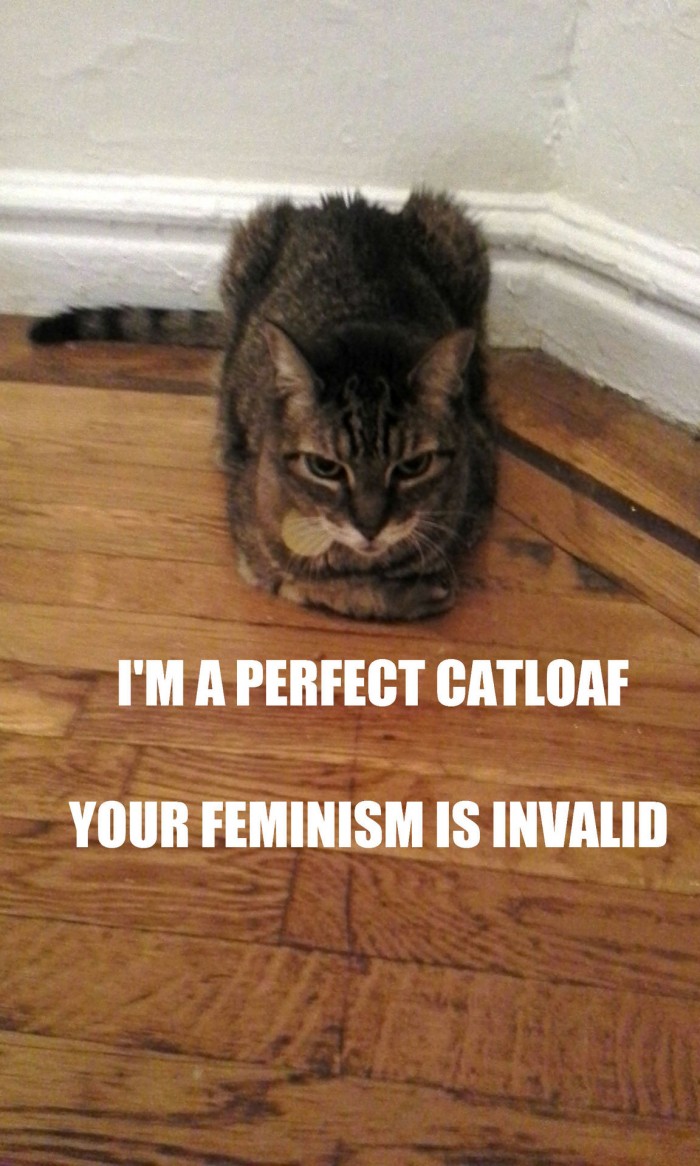My favorite website at the moment is a Tumblr called Confused Cats Against Feminism.
It emerged a couple weeks ago as a tongue-in-cheek response to the trending #WomenAgainstFeminism and its oft misguided, oft under-informed supporters.
It is, in my opinion, a brilliant piece of satire.
Sometimes silly, sometimes ironic, the most effective memes on this site take some of #WomenAgainstFeminism’s preferred tropes and place them in the sardonic mouths of adorable cats (and dogs and rabbits, too) to illustrate the total absurdity of the originals.
For example, many of the women posting to #WomenAgainstFeminism have written things like “I don’t need feminism because I like looking good/getting compliments,” or, “I don’t need feminism because I am not oppressed,”
Or how about “I don’t need feminism because I love men.”
Wow. Where should I start?
The posts on “Confused Cats Against Feminism” are clever and giggle-worthy…if you understand why the originals are so off-base.
The self-proclaimed women against feminism seem to believe that:
a. Feminists hate make-up, dresses, and compliments (check this out for an insightful read on how women have reclaimed another trend, #feministsareugly, and twisted it around in an empowering way.)
b. Feminism is for “third world oppressed women” (let’s free them in the name of 21st century imperialism) and 1950s housewives chained to the stove—we’re voting and working, what more could we possibly ask, right? And
c. Feminists hate men. Men and women are gladiators, apparently, and only one of us can come out alive.
Just, no.
a. Doesn’t even merit a response.
b. There is plenty of evidence that even in the “first world,” women suffer unbelievable discrimination and inequality.
Both through #womenagainstfeminism and conversations with other women, I have come to understand the crux of the argument as “I am against feminism because I don’t need it to [fill in the blank…]” Maybe so, but the world definitely still does. And…
c. Well, okay. I don’t think feminists have gone so far as to declare hatred, but some of Second Wave Feminist theory in the 1970s did advocate for fairly radical action in the name of equality. That is, Second Wave feminists suggested a revised body of scholarship that would highlight the female experience in lieu of the male, thus correcting centuries, millennia, even, of gender bias.
But they didn’t hate men, and neither do I.
I identify proudly and loudly as a feminist. I like pretty dresses, and men; I do not, however, enjoy street harassment, daily doses of sexism, and the pervading air of misogyny that lingers in American society, especially pop culture. I believe, fundamentally, in equality.
Unfortunately, I seem to be in the minority of “twenty-somethings” to actively and adamantly identify as a feminist.
For my thesis work in Anthropology this past spring, I explored female Jewish identity at my college. I interviewed 15 Jewish women on campus, and I expected many of my interview subjects to have strong opinions on the intersection of Judaism and feminism (as I do). Finally, though, nine of my 15 subjects did not identify as feminists. This made me very sad.
To call myself a minority may be a tad bit melodramatic. In a 2012 poll, 55 percent of American women voters considered themselves feminists. After they read the textbook definition of a feminist, which after all this media hype, most of us have probably seen:
Feminist: “someone who supports political, economic and social equality for women,”
This percentage jumped to 68. For voters under the age of 30 (that’s us twenty-something’s), the numbers were higher still: 59 percent considered themselves feminists, 73 percent after reading a definition. (Source)
Part of me wants to see this as a glass 73 percent full. The large majority of (American) women of my generation, it seems, self-identify as feminists. (I don’t know the numbers for other nationalities.) What terrifies and saddens me, and dampens my optimism, is that after reading such a concise, inclusive definition of feminism, anyone could still be against it. Why, other 32 percent of women, are you so stubbornly, incorrigibly, against your own equality?
Yes, feminism gets a bad rep sometimes. And if you wanted to argue that it has sometimes been abrasive and a bit prickly, you could make a strong case. If you wanted to argue that feminism, at times, has stuck to the mainstream, at the cost of excluding women of color and women of the LGBT community, you could easily do so.
Others have made this argument far better than I can.
Nonetheless, I am shocked when female friends express apathy or antagonism towards feminism.
I can accept that many people hold negative stereotypes about feminists and feminism; if they are only under-informed, there is still hope that they might educate themselves on feminist theory and history and change their minds. I can accept that a particular personal experience may have turned someone off the broader feminist movement.
But I cannot accept that based on the definition of a feminist as “someone who supports political, economic and social equality for women,” 32 percent of American women still do not identify as such.
If cats and feminists have something in common, it is this: we can’t believe how stupid humans can be!
Love elephant and want to go steady?
Sign up for our (curated) daily and weekly newsletters!
Editor: Renée Picard
Images used with permission from We Hunted the Mammoth at Tumblr








Read 0 comments and reply